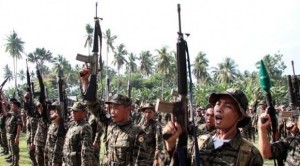ILIGAN CITY, Philippines – While the negotiation on the substantive issues of a political settlement between government and the Moro Islamic Liberation Front (MILF) has concluded, the parties are still expected to work on the fine details of the normalization process.
As envisioned by the peace panels, normalization is the process of returning to conditions “whereby communities can achieve their desired quality of life, which includes the pursuit of sustainable livelihood and political participation within a peaceful deliberative society.”
Based on the Annex on Normalization just signed, the peace panels are expected to constitute the Joint Normalization Committee (JNC) within two months, that is, by March 25. The JNC is primarily tasked with coordinating the activities related to normalization.
In all, the whole package of normalization constitutes measures on policing inside the Bangsamoro and interim security arrangements; decommissioning of the MILF’s armed wing— the Bangsamoro Islamic Armed Forces (BIAF); redeployment of government forces within the Bangsamoro; clearing of unexploded ordnance in once battlefront areas; disbanding of private armed groups (PAGs); socio-economic support to former combatants; transitional justice; and grant of amnesty or pardon to persons who committed “offenses connected to the armed conflict in Mindanao.”
The nature, character and structure of the police force in the future Bangsamoro is currently being worked out by the Independent Commission on Policing (ICP), which is headed by a representative of the Canadian government.
Work of the ICP started mid-October last year and is expected to wind up by April so that its recommendations will be in time for the drafting of the Bangsamoro Basic Law, the charter of the new autonomous entity.
Such police force is envisioned to be professional and civil in character, and responsible to the central government, the Bangsamoro government, and the communities it serves.
In the period prior to the establishment and functioning of the Bangsamoro police force, government and the MILF will cooperate in the maintenance of peace and order through the Joint Peace and Security Committee (JPSC) that will, in turn, oversee the work of Joint Peace and Security Teams (JPSTs).
The JPSTs will be composed of contingents from the BIAF, the Armed Forces of the Philippines (AFP), and the Philippine National Police (PNP).
Decommissioning involves the “smooth transition for the BIAF members to productive civilian life” so that “they are put beyond use.” This is agreed to be on a graduated manner.
An Independent Decommissioning Body (IDB) will be created to oversee this specific process. It was agreed to constitute this with three experts nominated by foreign governments and four local experts to be nominated by the parties.
The IDB will be responsible for doing inventory, verification and validation of BIAF members, arms and weapons. It shall also establish the methods of retrieval of and rendering the weapons beyond use.
The grant of livelihood assistance to former BIAF members and to their communities is related to the process of decommissioning.
Although the detailed schedule is yet to be released by the parties, the normalization annex provides that decommissioning of the MILF forces “shall be parallel and commensurate to the implementation of all the agreements of the Parties.”
Inquirer sources said that in that schedule, a specific number of BIAF members and weapons have to be decommissioned “for every political milestone” in the peace process such as, for example, the enactment of the Basic Law.
In the normalization annex, the parties agreed that the AFP “shall only retain installations necessary for national defense and security.”
But the redeployment of AFP troops will be done based on the result of a joint security assessment “to avoid a security vacuum in the Bangsamoro.”
Hence, just like the gradual manner in which the BIAF is being decommissioned, the redeployment of AFP troops is also “consistent with a normal and peaceful life and the progress in other aspects of normalization.”
Disbanding of private armed groups (PAGs) will be a joint initiative of the government and the MILF. The parties have yet to adopt guidelines on how to undertake this task.
As agreed, the JPSTs will be responsible for tracking and documenting these groups.
As a further confidence-building measure between government and the MILF, the annex on normalization provides for the creation of task forces responsible for planning measures to transform a select number of BIAF stronghold areas into “peaceful and productive communities.”
These are Camp Abubakar in Maguindanao, which was the MILF headquarters; Camp Bilal that straddles towns in Lanao del Norte and Lanao del Sur; Camp Omar in Maguindanao where some elements of the Bangsamoro Islamic Freedom Fighters roam; Camp Rajamuda stradding Liguasan Marsh communities in North Cotabato and Maguindanao; Camp Badre in Maguindanao; and Camp Bushra in Lanao del Sur.
All these strongholds were verified in 1999 as MILF camps for the purpose of ceasefire coordination. All these were overrun by AFP troops during the 2000 all-out war campaign of then President Joseph Estrada who was wary such “camp verification” processes was a sign of formally giving up territories of the Philippine republic to rebel control.
RELATED STORIES
GPH, MILF peace pact complies with the Constitution – Palace
PH to grant amnesty, pardon Muslim rebels
Gov’t, MILF see final peace deal in weeks
